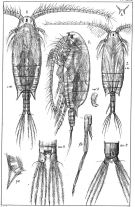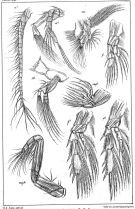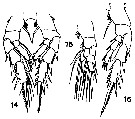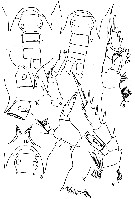|
|
 |
|
Calanoida ( Order ) |
|
|
|
Clausocalanoidea ( Superfamily ) |
|
|
|
Aetideidae ( Family ) |
|
|
|
Bradyidius ( Genus ) |
|
|
| |
Bradyidius armatus Giesbrecht, 1897 (F,M) | |
| | | | | | | Syn.: | Pseudocalanus armatus : Brady, 1878 (p.46, figs.F), no Boeck; no Thompson, 1900 c (p.278);
Bradyanus armatus Vanhöffen, 1897 (p.322, Rem.); Mrazek, 1902 (p.521); no B. armatus : Wolfenden, 1905 (p.1005);
Undinopsis bradyi : Sars, 1902 (1903) (p.32, figs.F,M); Rose, 1933 a (p.92, figs.F,M); Wilson, 1942 a (p.210, fig.M); Vives, 1967 (tab.II); Evans, 1968 (p.15); Dowidar & El-Maghraby, 1970 (p.269); Vives & al., 1975 (p.41, 42, tab.II, XII); Vives, 1982 (p.291); Kovalev & Schmeleva, 1982 (p.83); Kim & al., 1993 (p.270); Shih & Young, 1995 (p.67);
no Undinopsis armatus : With, 1915 (p.88);
Bradyidius bradyi : Matthews, 1964 (p.18, figs. juv,F,M, Rem.); 1967 (p.159, Table 1, Rem.);Grice & Hulsemann, 1967 (p.14); Bradford, 1976 a (p.1, 6: Rem.); Bradford & Jillett, 1980 (p.21); Othman & Greenwood, 1987 (p.1137) | | | | Ref.: | | | Giesbrecht, 1897 b (p.253, Rem.); Giesbrecht & Schmeil, 1898 (p.32); T. Scott, 1898 i (p.264, figs.F,M); Mràzek,1902; A. Scott, 1909 (p.39, figs.F); Wolfenden, 1911 (p.210); ? Mori, 1937 (1964) (p.39, figs.F); Vervoort, 1952 b (n°43, p.3, 4); Park, 1966 (p.810); Markhaseva, 1993 a (p.47, figs.F, Rem.); 1996 (p.70, figs.F,M); Bradford-Grieve, 2003 (p.102, tab.3); Vives & Shmeleva, 2007 (p.551, figs.F,M, Rem.) |  issued from : G.O. Sars in An Account of the Crustacea of Norway. Vol. IV. Copepoda Calanoida. Published by the Bergen Museum, 1903. [Pl.XIX]. As Undinopsis Bradyi. Female & Male. R = rostrum (frontal view); pr = corner of the last thoracic segment; M = Md; m = Mx1; mp1 = Mx2; Mp2 = Mxp. Nota Female: Eye very conspicuous, bright red (in the living animal), and oblong in form. Exopod of A2 scarcely longer than the endopod. Endopod of 2nd to 4th swimming legs with scatterad small spinules on the posterior face. Ovaries purple-coloured.
|
 issued from : G.O. Sars in An Account of the Crustacea of Norway. Vol. IV. Copepoda Calanoida. Published by the Bergen Museum, 1903. [Pl.XX]. As Undinopsis Bradyi. Female. mp1 = Mx2
|
 issued from : A. Scott in Siboga-Expedition, 1909, XIX a. [Plate VI, Figs.1-11]. Female (from Indonesia-Malaysia): 1, habitus (dorsal); 2, forehead (lateral); 3, last thoracic and genital segments (left side); 4, rostrum; 5, A1; 6, A2; 7, Mx2; 8, Mxp; 9, P1; 10, P2; 11, P4. Nota: The 'Siboga' specimens differ from the Norwegian form in size, and in length of the spines of the last thoracic segment. A comprison between the 'Siboga' specimens with examples from the Firth of Clyde, with the exception of the size, appear similar.
|
 issued from : T. Mori in The pelagic Copepoda from the neighbouring waters of Japan, 1937 (2nd edit., 1964). [Pl.17, Figs.1-5]. With doubt. Female: 1, 4, habitus (lateral and dorsal, respectively); 2, P4; 3, A2; 5, Mx1.
|
 issued from : T. Mori in The pelagic Copepoda from the neighbouring waters of Japan, 1937 (2nd edit., 1964). [Pl.16, Figs.14-16]. With doubt. Female: 14, P2; 15, P1; 16, P3.
|
 issued from : E.L. Markhaseva in Zoosyst. Rossica, 1993, 2 (1). [p.48, Figs.1-10]. Female (from Langesundsforden, Norway): 1-2, last segment of prosome and urosome; 3-5, last segment of prosome and genital segment (left lateral, right lateral and dorasal, respectively); 6, exopod of A2; 7, Md; 8, P1; 9, P2; 10, rostrum. Nota : Cephalothorx about 3-4 times longer than urosome. Rostral rami divergent. A1 nearly as long as cephalothorax, reaching or exceeding posterior border of genital segment. Exopodite 1 of A2 without setae, exopodite 2 with 3 setae. Endopodite 1 of Md with 2, endopodite 2 with 9 setae. Posterior corners of last thoracic segment divergent, their points exceeding posterior boder of genital segment. Spermatheca rounded. External spine at exopodite 1 of P1 slightly exceeding the base of the following spine. Posterior surfaces of endopod of P2-P4 with minute spinules.
|
 Bradyidius armatus Bradyidius armatus female: 1 - Rostrum with divergent rami. 2 - Points of last thoracic segment reaching and even exceeding posterior border of genital segment. Exopodal segment 2 of A2 with 3 setae. Exopodal segment 1 of P1 with external spine exceeding the base of external spine of external segment 2. 3 - Points of last thoracic segment straight. 4 - Genital segment 1.2-1.3 times wider than long. Exopodal segment 1 of A2 without seta. Spermatheca rounded.
|
 Bradyidius armatus Bradyidius armatus male: 1 - P5 uniramous. 2 - Right P5 nearly 3 times shorter than left. 3 - Distal (3rd) segment of right P5 with 1 terminal small spine.
| | | | | Compl. Ref.: | | | T. Scott, 1902 (p.451, Rem.); Pearson, 1906 (p.11, Rem.); C.B. Wilson, 1950 (p.173); ? King & Hida, 1955 (p.11); Chiba & al., 1957 (p.308); 1957 a (p.11); Delalo, 1968 (p.137); Markhaseva, 1998 (p.250, Fig.2); Razouls & al., 2000 (p.343, tab. 4, Appendix); Holmes, 2001 (p.46, Rem.); Markhaseva & Schnack-Schiel, 2003 (p.120, Rem.); Kosobokova & al., 2007 (p.929: Tab.7); Dvoretsky & Dvoretsky, 2010 (p.991, Table 2); Salah S. & al., 2012 (p.155, Tableau 1); Dvoretsky & Dvoretsky, 2012 (p.1321, Table 2, 3, 5, abundance, biomass, production); El Arraj & al., 2017 (p.272, table 2, spatial distribution); Chaouadi & Hafferssas, 2018 (p.913, Table II: occurrence). | | | | NZ: | 13 + 1 doubtful | | |
|
Distribution map of Bradyidius armatus by geographical zones
|
| | | | | | | | | | | | | | | | | | | Loc: | | | Antarct. (Indian: continent), Congo, Azores, Norway, Greenland, Ireland, Porcupine Bank, Great Britain, Clyde, Scottish coasts, Shetland Is., Norway (Raunefjorden: all the year), Barents Sea, North Sea, Cap Ghir, Moroccan coast, Ibero-morocco Bay, Medit. (Sidi Fredj coast, W Basin, Malta, East Basin, Alexandria), Red Sea, Maldives Is., Indian, Indonesia-Malaysia, Philippines, China Seas (South China Sea), S Korea, S Japan, Okhotsk Sea, ? Pacif. (equatorial central), off S Easter Is. (in Wilson, 1942 a , p.69) | | | | N: | 30 | | | | Lg.: | | | (5) F: 1,7; (37) F: 2,7-2,65; M: 2,2-1,5; (65) F: 2,65; M: 2,2; {F: 1,70-2,70; M: 1,50-2,20} | | | | Rem.: | epi-mesopelagic. Hyperbenthic (Oslo Fjord to Vardö between 30-70 m. on muddy bottom)
Sampling depth (Antarct.) : 3000 m.
The locality records other than the North Atlantic seem not certain and need confirmation.
David Nicolson (Data Development Coordinator, Integrated Taxonomic Information System
Biologist, USGS/NBII, ITIS, http://www.itis.gov) (comm. pers. 3/12/2007) writes, regarding the nomenclature of Bradyidius armatus Giesbrecht 1897 :
Sometimes a doubt subsists concerning the valid name of the species, however Chris Thompson confirms the validity (see ICZN: Article 70.4, Identification of type species by deliberate misidentification, and article70.4.1 apply, and refer us to Art. 11.10 & 67.13. Under these articles, Bradyidius armatus Giesbrecht 1897 is deemed to be a new nominal species).After Markhaseva (1993, p.47) : Boeck (1872) described a species of Aetideus under the name Pseudocalanus armatus. Brady (1878) identified the material from England as P. armatus Boeck. The male was identified correctly, but the female belonged to another genus. Giesbrecht (1897) noticied this mistake and proposed a new genus, Bradyidius, for P. armatus female sensu Brady (not specifying wheter for male or for female). From Article 70c of ICZN, it follows that by doing so Giesbrecht ; contraryto the opinion of Matthews (1964), the fact that Giesbrecht himself has not mentioned such a combination, is of no importance. Vanhöffen (1897) noticied that P. armatus sensu Brady is actually a mixture of two species belonging to two genera, therefore he rejected the name Bradyidius and proposed the new name Bradyanus expressly for females that were erroneously identified by Brady as P. armatus. From the sale Article 70c it follows that by doing so Vanhöffen established a new nominal species Bradyanus armatus and this name should be treated as junior synonym of Bradyidius armatus Giesbrecht, notwithstanding the fact that latter Vanhöffen (1897b, 1907) used the specific name armatus for specimens of an other species (probably B. similis).
| | | Last update : 25/10/2022 | |
|
|
 Any use of this site for a publication will be mentioned with the following reference : Any use of this site for a publication will be mentioned with the following reference :
Razouls C., Desreumaux N., Kouwenberg J. and de Bovée F., 2005-2026. - Biodiversity of Marine Planktonic Copepods (morphology, geographical distribution and biological data). Sorbonne University, CNRS. Available at http://copepodes.obs-banyuls.fr/en [Accessed March 02, 2026] © copyright 2005-2026 Sorbonne University, CNRS
|
|
 |
 |









